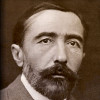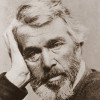“ For himself a most portentous contradiction; the two ends of his life not to be brought into harmony. He sits at the tables of grandees; and has to copy music for his own living. ”
Thomas Carlyle, On Heroes, Hero-Worship, and The Heroic in History (1841). copy citation
| Author | Thomas Carlyle |
|---|---|
| Source | On Heroes, Hero-Worship, and The Heroic in History |
| Topic | contradiction music |
| Date | 1841 |
| Language | English |
| Reference | |
| Note | |
| Weblink | http://www.gutenberg.org/files/1091/1091-h/1091-h.htm |
Context
“The waiters and ostlers of Scotch inns, prying about the door, eager to catch any word that fell from Burns, were doing unconscious reverence to the Heroic. Johnson had his Boswell for worshipper. Rousseau had worshippers enough; princes calling on him in his mean garret; the great, the beautiful doing reverence to the poor moon-struck man. For himself a most portentous contradiction; the two ends of his life not to be brought into harmony. He sits at the tables of grandees; and has to copy music for his own living. He cannot even get his music copied: "By dint of dining out," says he, "I run the risk of dying by starvation at home." For his worshippers too a most questionable thing! If doing Hero-worship well or badly be the test of vital well-being or ill-being to a generation, can we say that these generations are very first-rate?—And yet our heroic Men of Letters do teach, govern, are kings, priests, or what you like to call them; intrinsically there is no preventing it by any means whatever.”
source


